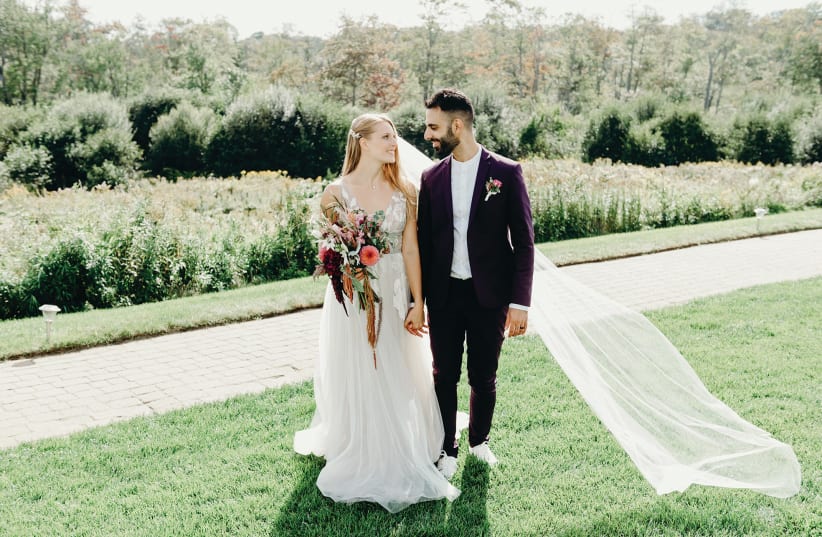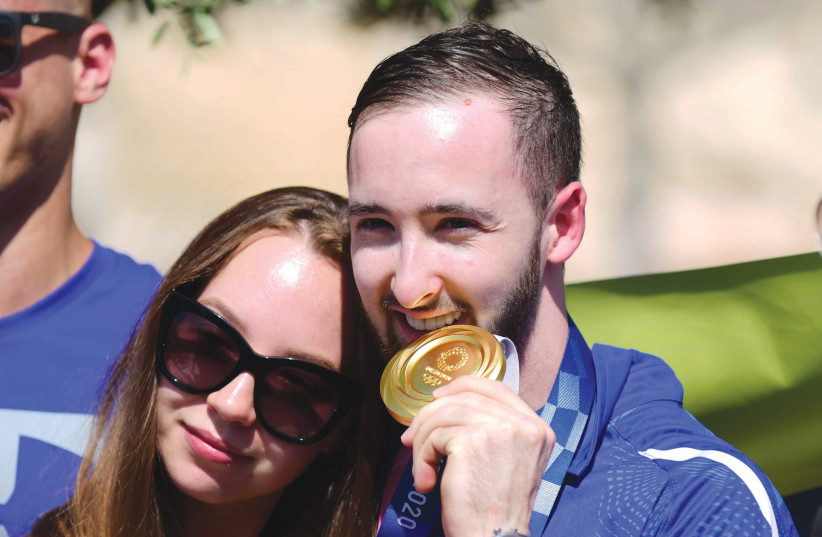Since moving to Israel from the US in 2019, I’ve certainly faced my share of challenges. But I’ve also made a nice life for myself. I’ve made friends, worked in hi-tech, and found a loving partner.
We share an apartment in Ramat Gan, where I spend much of my time writing while he provides background music through his work as a pianist. Generally speaking, we’re very happy, and a year ago we decided to get married. This decision brought with it a particular predicament, one that thousands of Israeli couples have had to face for decades.
The most recent and famous case is that of Artem Dolgopyat, the Olympic gymnast who recently won Israel its second-ever gold medal, and his fiancee, Maria Sakovichas.
I love Israel, I consider myself a Zionist, and I’ve never once regretted my choice to move here. I’m proud of my Jewish heritage. Unfortunately, pride is not enough. Like Dolgopyat, my mother is not Jewish, and so the rabbinate does not recognize me as a Jew, and will not marry me and my partner. Israel has no alternative course for marriage for people like us.
When I told my parents that we wanted to get married, my father, in particular, was especially excited. He was more than just happy for me – he was beaming.
“I can just picture your grandparents in heaven,” he said. “You, going to live in the Jewish homeland, and marry someone Jewish. They’d be over the moon.”
I’m the 11th of their 12 grandchildren, and among us only the second to marry a Jew. Many of the others married Catholics. Some are strictly secular. My dad’s imagery filled me with pride. I’d be a continuing link in an otherwise disappearing chain. It was a way to remain connected to the grandparents I’d never really known.
We decided to get married in Maine, where both of my parents are from, and where much of my extended family still resides. When we shared this news with my friends and relatives, they were thrilled – this would make it much easier for them to be able to attend and share in our joy.
Many were also a bit surprised. Why would we leave the lives we’d created in Israel to get married abroad? What about his family? I wanted to get married in a place where my loved ones could easily be present, that was true, but there was also the logistical factor of having no choice. The reactions I received upon explaining that even as a citizen I’m not legally able to get married here ranged from curiosity to downright disgust. How could I be a citizen of a particular country and still not have this right?
One of the main arguments for the existence of Israel is that Jews need a homeland, a place of guaranteed safety in relation to our Judaism. This is why we have the Law of Return, which grants safety through citizenship to anyone who would have been considered Jewish during the Holocaust – even people like myself, whose Judaism comes from my father’s side.
If Israel should exist as such a haven, why should its government discriminate among those it claims to protect? Patrilineal Jews were certainly a percentage of the 6,000,000 lost. It’s dehumanizing for anyone in this position to not have the same rights as everyone else; and if religious leaders refuse to recognize our status as valid, then the government needs to provide another option.
Aside from being restrictive, the laws are also arbitrary. Tens of thousands of Karaite Jews live in Israel today, and following only the written Torah, they recognize Judaism as being inherited from one’s father. I’m not of Karaite descent, but it raises the question of why Israel’s civil law is shaped by the interpretations of one religious movement over another. Who is a Jew? It depends on who you ask.
I’m not arguing for the abolition of rabbinate-sanctioned marriage for those who prefer to follow this tradition. But the gatekeeping by a select group on who is to be granted certain rights is not benefiting anyone. We have to question the objective. Certain people, like me, have no choice but to go abroad, but even many who can legally wed here are choosing to leave rather than comply with an institution they do not support.
Some sources estimate that up to one-third of Israelis are now choosing to marry outside of Israel. Not only are the current laws pointless in terms of preventing these marriages, but they may also even be hurting Israel. Weddings aren’t cheap. How much money that could benefit the local economy is currently being spent abroad?
Discriminatory laws also provide ammunition for the rest of the world to criticize us when we claim to be a democracy. We cannot argue that we are a true democracy when all citizens do not have the same rights. The time has come for Israel to recognize civil marriage.
The writer grew up outside of Philadelphia, graduated from Drexel University in 2016 with a degree in Food Science, and traveled for a few years before making aliyah. She now lives in Ramat Gan with her husband, spending her time writing, cooking and practicing yoga.

